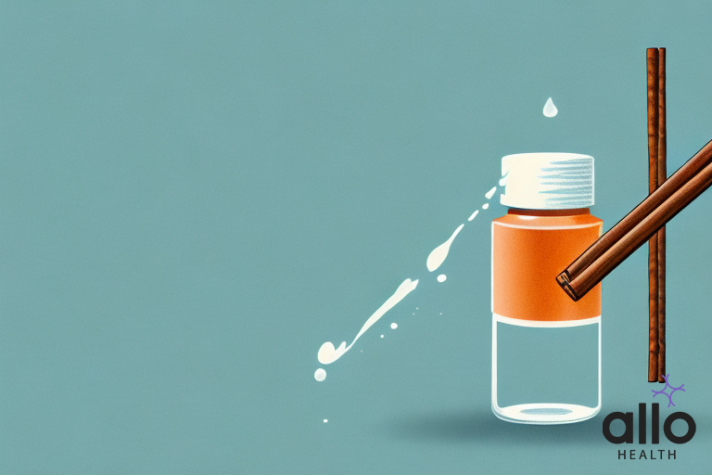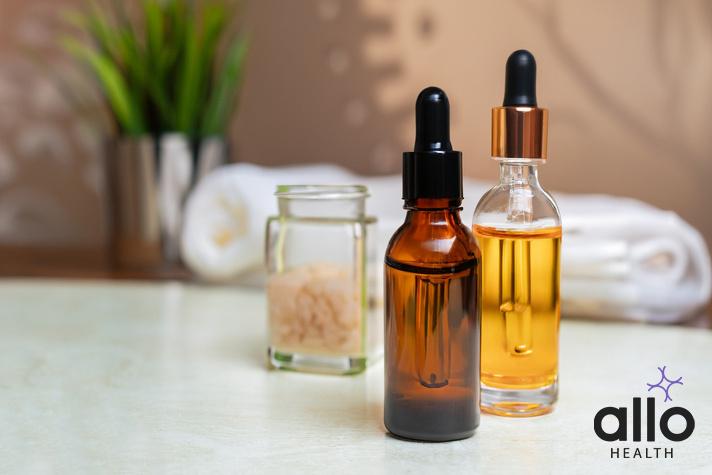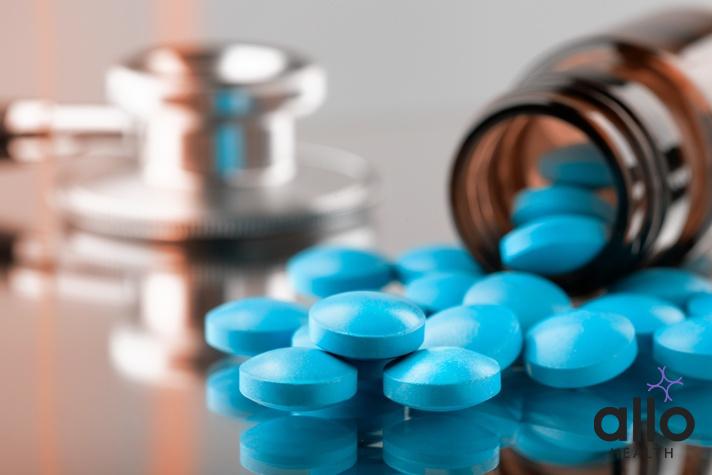Can Cinnamon Oil Treat Premature Ejaculation?

Allo Health is dedicated to personalized well-being, offering support and trusted information tailored to individual health goals. The platform emphasizes human-generated content, led by a distinguished medical team of experts, including physicians and sexual health specialists. Their commitment to credibility involves rigorous fact-checking, authoritative research, and continuous updates to ensure accurate, up-to-date information. Allo Health's unique approach goes beyond conventional platforms, providing expert-led insights and a continuous commitment to excellence, with user feedback playing a crucial role in shaping the platform's authoritative voice.

Dr Sanina Mansoor holds MBBS degree from Yenepoya university,Mangalore.She has 8 years of experience working as a medical officer at various health centres and medical colleges.
Why This Was Upated?
Our experts continually monitor the health and wellness space, and we update our articles when new information became available.
Updated on 07 February, 2024
- Article was updated as part of our commitment to diversity, equity, and inclusion.

"The following blog article discusses alternative medicine practices and their potential effects or benefits. However, it is important to note that the information provided is for general educational purposes only and should not be considered as medical advice or a substitute for professional guidance from a qualified healthcare professional. Before considering any alternative medicine practices or treatments, it is recommended to consult with a healthcare professional.
Book consultation
Alternative medicine encompasses a wide range of practices that may not have undergone rigorous scientific evaluation or received widespread acceptance within the medical community. The effectiveness, safety, and appropriateness of alternative medicine practices can vary significantly depending on the individual, their specific medical conditions, and other factors.
It is important to approach alternative medicine practices with caution and skepticism. Some practices may carry potential risks or interact with existing medical treatments. A healthcare professional can provide guidance based on your medical history, evaluate the available evidence, and offer informed advice regarding the potential benefits and risks of alternative medicine practices.
Individuals with specific medical conditions, allergies, or taking medications should exercise particular caution when considering alternative medicine practices. Some practices may have contraindications or adverse effects, and it is essential to discuss these potential concerns with a healthcare professional before pursuing any alternative treatments."
Premature ejaculation is a common concern faced by many men and can have a serious impact on sexual relationships. For those seeking a natural solution, cinnamon oil has been found to be effective in treating this condition. In this article, we will explore what premature ejaculation is, the causes behind it, and how cinnamon oil works as a remedy. We will also delve into the proper use of cinnamon oil, its potential side effects, and compare it to other natural remedies. Finally, we will round out the article by sharing real-life success stories and expert opinions from medical professionals.
What Is Cinnamon Oil?
Cinnamon oil is an essential oil derived from the bark, leaves, or twigs of the cinnamon tree, primarily Cinnamomum verum (Ceylon cinnamon) or Cinnamomum cassia (Cassia cinnamon). The oil is extracted through a process known as steam distillation or, in some cases, through a solvent extraction method.
Here are some key details about cinnamon oil:
- Chemical Composition: The main constituents of cinnamon oil include cinnamaldehyde, eugenol, linalool, and various other compounds. Cinnamaldehyde is responsible for the characteristic flavor and aroma of cinnamon.
- Types of Cinnamon Oil:
- Ceylon Cinnamon Oil: Extracted from Cinnamomum verum, this is often considered a higher quality and more expensive type of cinnamon oil. It has a sweeter and more delicate flavor compared to Cassia cinnamon oil.
- Cassia Cinnamon Oil: Derived from Cinnamomum cassia, this oil has a stronger and spicier aroma. It is more commonly found in the market and is often less expensive than Ceylon cinnamon oil.
- Uses and Benefits:
- Aromatherapy: Cinnamon oil is used in aromatherapy due to its warm, sweet, and spicy fragrance. It is believed to have uplifting and energizing effects on the mind.
- Culinary Purposes: Cinnamon oil is used in the food and beverage industry to impart a rich and spicy flavor to various dishes, desserts, and beverages.
- Health Benefits: It is believed to have certain health benefits, such as antimicrobial and anti-inflammatory properties. Some people use it for its potential digestive and immune system support.
- Caution:
- Cinnamon oil is potent and should be used in moderation.
- It is advisable to dilute it before applying it to the skin, as it can cause irritation in its concentrated form.
- Pregnant women and individuals with certain medical conditions should consult a healthcare professional before using cinnamon oil.
- Storage:
- Cinnamon oil should be stored in a dark, cool place to preserve its quality.
- It is sensitive to heat and light, and exposure to these elements can degrade its potency.
- Common Applications:
- Cinnamon oil is used in the production of perfumes, soaps, and candles.
- It is a popular ingredient in traditional medicine and natural remedies.
Always purchase cinnamon oil from reputable sources to ensure its purity and quality. It’s important to note that while cinnamon oil has potential benefits, individual reactions may vary, and consulting with a healthcare professional is advisable, especially for therapeutic use.
Cinnamon Oil Uses & Benefits
Cinnamon oil has a variety of uses and potential benefits, ranging from culinary applications to aromatherapy and traditional medicine. Here are detailed explanations of some common uses and potential benefits of cinnamon oil:
- Aromatherapy:
- Uplifting and Energizing: The warm and spicy aroma of cinnamon oil is believed to have mood-enhancing properties. In aromatherapy, it is often used to create a stimulating and invigorating atmosphere.
- Stress Relief: Some people use cinnamon oil in aromatherapy to alleviate stress and promote relaxation. Inhaling the scent may have a calming effect on the mind.
- Culinary Uses:
- Flavoring Agent: Cinnamon oil is widely used in the food industry as a natural flavoring agent. It adds a rich and spicy flavor to various dishes, desserts, and beverages.
- Baking: It is a popular ingredient in baking, where a small amount can be added to enhance the taste of cakes, cookies, and pastries.
- Health Benefits:
- Antimicrobial Properties: Cinnamon oil contains compounds like cinnamaldehyde, which have been studied for their antimicrobial properties. It may help fight against certain bacteria and fungi.
- Anti-Inflammatory Effects: Some research suggests that cinnamon oil may have anti-inflammatory properties, which could be beneficial in managing inflammation-related conditions.
- Digestive Aid: Cinnamon has traditionally been used to aid digestion. The oil may help alleviate digestive discomfort and support a healthy digestive system.
- Oral Health:
- Natural Breath Freshener: Due to its antimicrobial properties, cinnamon oil is sometimes used as a natural breath freshener. It may help combat bacteria in the mouth and contribute to oral hygiene.
- Skin Care:
- Anti-Acne Properties: Cinnamon oil’s antimicrobial and anti-inflammatory properties may be beneficial in skincare. It is sometimes used in diluted form as part of topical applications to address acne and related skin concerns.
- Warming Sensation: When diluted and applied to the skin, cinnamon oil can create a warming sensation. This property is sometimes utilized in massage oils or topical blends for a soothing effect.
- Insect Repellent:
- Natural Insecticide: Cinnamon oil is known for its insect-repelling properties. It may be used in natural insecticides or as part of homemade insect repellent solutions.
- Traditional Medicine:
- Immune System Support: In traditional medicine, cinnamon has been used for its potential immune-boosting properties. Cinnamon oil, with its concentration of bioactive compounds, is sometimes used to support overall immune health.
- Blood Sugar Regulation: Some studies suggest that cinnamon may help regulate blood sugar levels. While more research is needed, this has led to the exploration of cinnamon oil as a potential supportive measure for those with diabetes.
It’s important to note that while cinnamon oil offers potential benefits, it should be used with caution and in moderation. Before using cinnamon oil for therapeutic purposes, it’s advisable to consult with a healthcare professional, especially for individuals with underlying health conditions or those who are pregnant. Additionally, always choose high-quality, pure cinnamon oil from reputable sources.

Cinnamon Oil Side Effects & Precautions
While cinnamon oil has potential benefits, it is important to be aware of potential side effects and take necessary precautions, as it is a concentrated and potent essential oil. Here are detailed explanations of potential side effects and precautions associated with cinnamon oil:
Side Effects:
- Skin Irritation: Cinnamon oil is potent and can cause skin irritation, especially when used undiluted. It is advisable to dilute the oil with a carrier oil, such as coconut or jojoba oil, before applying it to the skin.
- Mucous Membrane Sensitivity: Direct contact with mucous membranes, such as the eyes, nose, and mouth, can cause irritation. Care should be taken to avoid contact with these sensitive areas.
- Allergic Reactions: Some individuals may be allergic to cinnamon or its components. Allergic reactions can range from mild skin irritation to more severe symptoms. It’s recommended to perform a patch test before widespread use.
- Photosensitivity: Cinnamon oil may cause photosensitivity, making the skin more sensitive to sunlight. Avoid exposure to direct sunlight or UV rays after applying cinnamon oil to the skin.
Precautions:
- Dilution: Always dilute cinnamon oil before applying it to the skin. A common dilution ratio is 1-2% (1-2 drops of cinnamon oil per teaspoon of carrier oil).
- Patch Test: Before using cinnamon oil extensively, perform a patch test on a small area of skin to check for any allergic reactions or irritation.
- Avoid Ingestion: While cinnamon is commonly used as a spice in food, cinnamon oil is highly concentrated and should not be ingested without proper guidance from a healthcare professional.
- Pregnancy and Breastfeeding: Pregnant and breastfeeding women should exercise caution and consult with a healthcare provider before using cinnamon oil. High doses may be associated with adverse effects during pregnancy.
- Medical Conditions: Individuals with certain medical conditions, such as liver disease or bleeding disorders, should consult with a healthcare professional before using cinnamon oil, especially in therapeutic applications.
- Quality Matters: Ensure that you purchase high-quality, pure cinnamon oil from reputable sources. Some commercially available products may contain synthetic additives or be diluted with other oils.
- Consultation with Healthcare Professional: Before using cinnamon oil for therapeutic purposes, especially for addressing specific health concerns, it is advisable to consult with a qualified healthcare professional. This is particularly important for individuals with pre-existing health conditions or those taking medications.
Remember that individual reactions to essential oils can vary, and it’s crucial to prioritize safety. If any adverse reactions occur, discontinue use immediately and seek medical attention if needed. Always use essential oils with mindfulness and respect for their potency.
Cinnamon Oil & Sexual Dysfunction
There is limited scientific evidence to support the direct use of cinnamon oil for the treatment of sexual dysfunction. Cinnamon oil is primarily known for its aromatic and flavoring properties, and it has been traditionally used in various cultures for culinary and medicinal purposes. While some studies suggest that certain compounds found in cinnamon may have potential health benefits, the evidence regarding its specific impact on sexual dysfunction is not well-established.
Potential Indirect Effects:
- Aromatherapy and Mood: Cinnamon oil, like many other essential oils, is often used in aromatherapy. Aromas can have psychological effects, and certain scents, including spicy and warm fragrances like cinnamon, may have the potential to create a sensual or mood-enhancing atmosphere.
- Stress Reduction: Chronic stress can contribute to sexual dysfunction. Some people find that engaging in stress-reducing activities, including aromatherapy with calming scents, can indirectly support overall well-being, potentially benefiting sexual health.
Important Considerations:
- Individual Variation: Responses to aromatherapy and scents can vary widely among individuals. While some may find the aroma of cinnamon oil pleasant and potentially mood-enhancing, others may not experience the same effects.
- Comprehensive Approach: Sexual dysfunction is a complex concern with various potential causes, including psychological, physiological, and interpersonal factors. It is essential to approach sexual health holistically and consider lifestyle, emotional well-being, and any underlying medical conditions.
Precautions:
- Skin Sensitivity: When using cinnamon oil in aromatherapy, it’s crucial to be mindful of potential skin sensitivity. Direct contact with undiluted cinnamon oil may cause irritation.
- Allergic Reactions: Individuals with known allergies to cinnamon or its components should avoid using cinnamon oil. Perform a patch test before widespread use to check for any adverse reactions.
- Consultation with Healthcare Professional: If sexual dysfunction is a concern, it’s advisable to consult with a healthcare professional. They can help identify potential underlying causes, provide appropriate guidance, and recommend evidence-based interventions.
- Safety and Dilution: If using cinnamon oil on the skin, always dilute it properly with a carrier oil to avoid irritation. Never ingest undiluted essential oils.
In summary, while some people may find certain scents, including cinnamon, to be pleasant and mood-enhancing, the direct impact of cinnamon oil on sexual dysfunction is not well-established in scientific literature. It is essential to approach sexual health concerns with a comprehensive perspective, consulting with healthcare professionals for personalized guidance and exploring evidence-based interventions when appropriate.
Cam Cinnamon Oil Treat Premature Ejaculation?
There is no robust scientific evidence to support the use of cinnamon oil as a specific and effective treatment for premature ejaculation. Premature ejaculation is a complex condition influenced by various factors, including psychological, hormonal, and neurological aspects. It is essential to approach the management of premature ejaculation with evidence-based methods and under the guidance of healthcare professionals.
Cinnamon oil is primarily known for its aromatic and flavoring properties, and it has been traditionally used in various cultures for culinary and medicinal purposes. While some studies suggest that certain compounds found in cinnamon may have potential health benefits, there is a lack of scientific research specifically demonstrating its efficacy in addressing premature ejaculation.
Factors to Consider:
- Psychological and Behavioral Approaches: Premature ejaculation is often addressed through psychological and behavioral interventions. These may include counseling, psychotherapy, and techniques such as the start-stop method or the squeeze technique.
- Medical Treatments: In some cases, healthcare professionals may prescribe medications, such as selective serotonin reuptake inhibitors (SSRIs), to help delay ejaculation. However, any medication should be prescribed and monitored by a qualified healthcare provider.
- Lifestyle Modifications: Lifestyle factors, such as stress management, regular exercise, and a healthy diet, can contribute to overall sexual health. It’s important to address any underlying concerns that may be affecting sexual function.
Precautions:
- Consultation with Healthcare Professional: If premature ejaculation is a concern, it’s crucial to seek advice from a healthcare professional. They can help identify potential causes and recommend appropriate interventions based on individual circumstances.
- Safety of Essential Oils: If considering the use of essential oils, including cinnamon oil, it’s essential to prioritize safety. Essential oils are potent and should be used with caution. Always dilute them properly with a carrier oil before applying to the skin and avoid ingestion unless under the guidance of a healthcare professional.
- Individual Variability: Responses to various interventions, including essential oils, can vary among individuals. What works for one person may not work for another, and it’s essential to approach treatments with realistic expectations.
It’s important to note that the field of medical research is dynamic, and new studies may emerge over time. As of my last update in January 2022, there may be more recent developments or research findings that I am not aware of. Individuals seeking information on this topic are encouraged to consult with healthcare professionals for the latest evidence-based guidance.

Treatments For Premature Ejaculation
Premature ejaculation (PE) is a common sexual dysfunction characterized by the persistent occurrence of ejaculation with minimal sexual stimulation, often before or shortly after penetration. Treatment approaches for premature ejaculation can vary, and they may include psychological, behavioral, medical, and lifestyle interventions. It’s important to consult with a healthcare professional to determine the most appropriate approach based on individual circumstances. Here’s an overview of various treatments for premature ejaculation:
- Psychological and Behavioral Therapies:
- Counseling and Psychotherapy: Addressing psychological factors like performance anxiety.
- Sex Therapy: Providing guidance on sexual techniques and emotional aspects of intimacy.
- Behavioral Techniques:
- Start-Stop Technique: Halting sexual activity before ejaculation, allowing arousal to subside.
- Squeeze Technique: Applying pressure to the base of the penis to delay ejaculation.
- Topical Anesthetics: Desensitizing Creams or Sprays: Products with local anesthetics (e.g., lidocaine) to reduce penile sensitivity.
- Oral Medications:
- SSRIs: Antidepressants like sertraline, paroxetine, or dapoxetine (specifically for PE) to delay ejaculation.
- Phosphodiesterase-5 Inhibitors: Medications like sildenafil or tadalafil (off-label) for improved ejaculatory control.
- Pelvic Floor Exercises:
- Kegel Exercises: Strengthening pelvic floor muscles to enhance ejaculatory control.
- Pelvic Floor Physical Therapy: Professional guidance for targeted exercises.
- Educational Resources: Self-Help Books and Resources: Educational materials on sexual health and techniques for managing premature ejaculation.
- Lifestyle Modifications:
- Healthy Lifestyle: Regular exercise, balanced diet, and sufficient sleep for overall well-being.
- Stress Management: Techniques such as meditation and mindfulness to address psychological factors.
- Combination Therapies: Integrating different approaches, such as combining behavioral techniques with medication or counseling for enhanced outcomes.
Remember that individual responses vary, and a personalized approach under the guidance of a healthcare professional is crucial. Always seek professional advice before initiating any treatment for premature ejaculation.
Most Asked Questions
-
Can cinnamon oil be used to treat untimely ejaculation?
While cinnamon oil is known for its fragrant and flavoring houses, there may be insufficient medical proof to aid its efficacy in treating premature ejaculation. Premature ejaculation is a complicated circumstance prompted by way of various factors, and remedies should be based on well-installed interventions endorsed via healthcare specialists.
-
Are there any precise research supporting cinnamon oil for untimely ejaculation?
As of my last know-how update in January 2022, there are no unique studies demonstrating the effectiveness of cinnamon oil in treating premature ejaculation. It's important to rely on proof-based totally methods and consult healthcare experts for guidance on addressing sexual fitness concerns.
-
Are there opportunity treatments for untimely ejaculation?
Yes, opportunity treatments for untimely ejaculation consist of psychological and behavioral approaches including counseling and strategies just like the begin-prevent or squeeze approach. Medical interventions, lifestyle adjustments, and addressing underlying troubles are also part of comprehensive control.
-
Can way of life modifications assist with untimely ejaculation?
Lifestyle modifications, along with strain management, everyday exercising, and a wholesome weight loss plan, can contribute to typical sexual fitness. However, unique suggestions should be discussed with a healthcare expert based on man or woman circumstances.
-
Is it secure to use cinnamon oil with out medical steering for premature ejaculation?
Using cinnamon oil with out scientific guidance for untimely ejaculation isn't recommended. Essential oils are strong and must be used cautiously. It's vital to visit a healthcare professional for personalised recommendation and to discover evidence-based interventions.






































